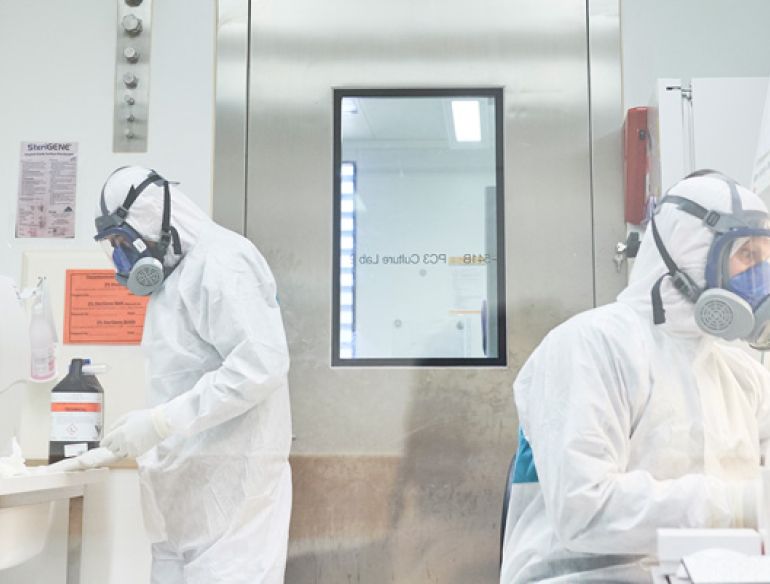A combined $7.55 million has been awarded to two immunology projects at the Kirby Institute at UNSW Sydney via the Australian Government’s highly competitive Medical Research Future Fund (MRFF) scheme.
$6.6 million has been awarded through the Pathogen Genomics initiative to a large collaborative multidisciplinary team led by Kirby Institute Director Professor Anthony Kelleher, to investigate the effectiveness of HIV and hepatitis C public health initiatives using viral genomics.
The significant project will see the establishment of national networks, governance and infrastructure to enable enhanced collection of public health metadata and viral sequence for HIV and hepatitis C across the country.
“Using the latest technology and innovation in molecular epidemiology, this research will facilitate the rapid genomic analysis of virus diversity and transmissions networks for HIV and hepatitis C infection in Australia, in near real-time,” says Professor Kelleher. “Very importantly, these systems will be developed in partnership with peak community bodies to ensure patient privacy is a primary consideration, and that any systems developed are acceptable to affected communities.”
The project, which is the first of its kind in Australia, will deploy high-level viral sequencing and bioinformatic systems into existing clinical and public health networks. This will enable the identification of trends in virus spread and new infections and enhance the already highly effective public health response to these increasingly dispersed epidemics.
“The ability to conduct molecular epidemiological analyses in near real-time will improve Australia’s already world-class response to HIV and hepatitis C, by allowing us to finely map the effectiveness of particular public health strategies, and to optimise our efforts by identifying areas where more targeted campaigns are necessary. We hope this model will allow more effective use of public health investments and allow targeting to areas of greatest need,” continued Professor Kelleher.
This ambitious research program will be conducted in close collaboration with colleagues within the Public Health Laboratory Network (PHLN), jurisdictional public health units, industry, and multiple partners from community.
“The current COVID-19 pandemic has shown the importance and effectiveness of a coordinated nation-wide system for the collection, analysis, and interpretation of pathogen transmission. We hope this project will fill the gaps of current prevention strategies, enabling a rapid and effective public health response with the aim of virtually eliminating these infections in Australia," says Professor Kelleher.
$1 million for COVID-19 immunology studies
A grant of $995,500 has been awarded to a team from the Kirby Institute, UNSW, Lifeblood, The Garvan Institute, and St Vincent’s Centre for Applied Clinical Research. Led by the Kirby Institute's Associate Professor Stuart Turville, the research will explore the body’s immune response to COVID-19.
“People who become infected with SARS-CoV-2 have a range of immune responses. Some clear the virus with limited involvement of antibodies and other forms of longer term acquired immunity,” explains Associate Professor Turville. “Other patients mount a longer, sustained response, with secretion of high levels of antibodies and mobilisation of T cells, a key component of cellular immunity. The latter are produced to combat the spread of the virus in patients that may have symptoms of greater disease severity.”
This project will analyse patient antibodies and cells over time. Many assays have already been developed from scratch in the Kirby Institute’s Glendonbrook Laboratories in order to map the COVID-19 immune response.
Associate Professor Turville says that it is critical to understand the immune response in great detail, in order to inform public health measures, treatment, and vaccine delivery. “By studying the immune response in a range of patients, we will be able to understand the overall risk of re-infection in the community and if the immune response contributes to any ongoing symptoms following COVID-19 infection,” he says.
The research will identify patients with potent immune responses to the virus, and will investigate how and why certain individuals have mounted a greater immune response. This information will be used to understand natural immunity to the virus and for immunotherapy and vaccine development.
The researchers are also exploring the ability to harvest key aspects of a recovered patient’s immune response to deliver to other patients with greater disease severity as treatment. “This work will have a direct impact on informing how we live with and treat this virus moving forward,” says Associate Professor Turville.
A key aspect of the study will combine highly sensitive and novel methodology to follow two unique patient cohorts. The first is through a collaborative partnership with Australian Red Cross Lifeblood, which coordinates thousands of blood donors nationwide who have recovered from COVID-19. The second is a Sydney-based cohort called ADAPT, headed by the Kirby Institute’s Associate Professor Gail Mathews at St Vincent’s Hospital. Combining both cohorts, the study will not only give us a snapshot of the overall immune responses across Australia, but also how this relates to disease severity and ongoing COVID-19-related symptoms.
“The need for knowledge of the immune response, along with the right biomedical tools, is paramount in building the arsenal to stop the spread of COVID-19, and in the short-term, generating immunotherapeutics to save people’s lives,” says Associate Professor Turville.
